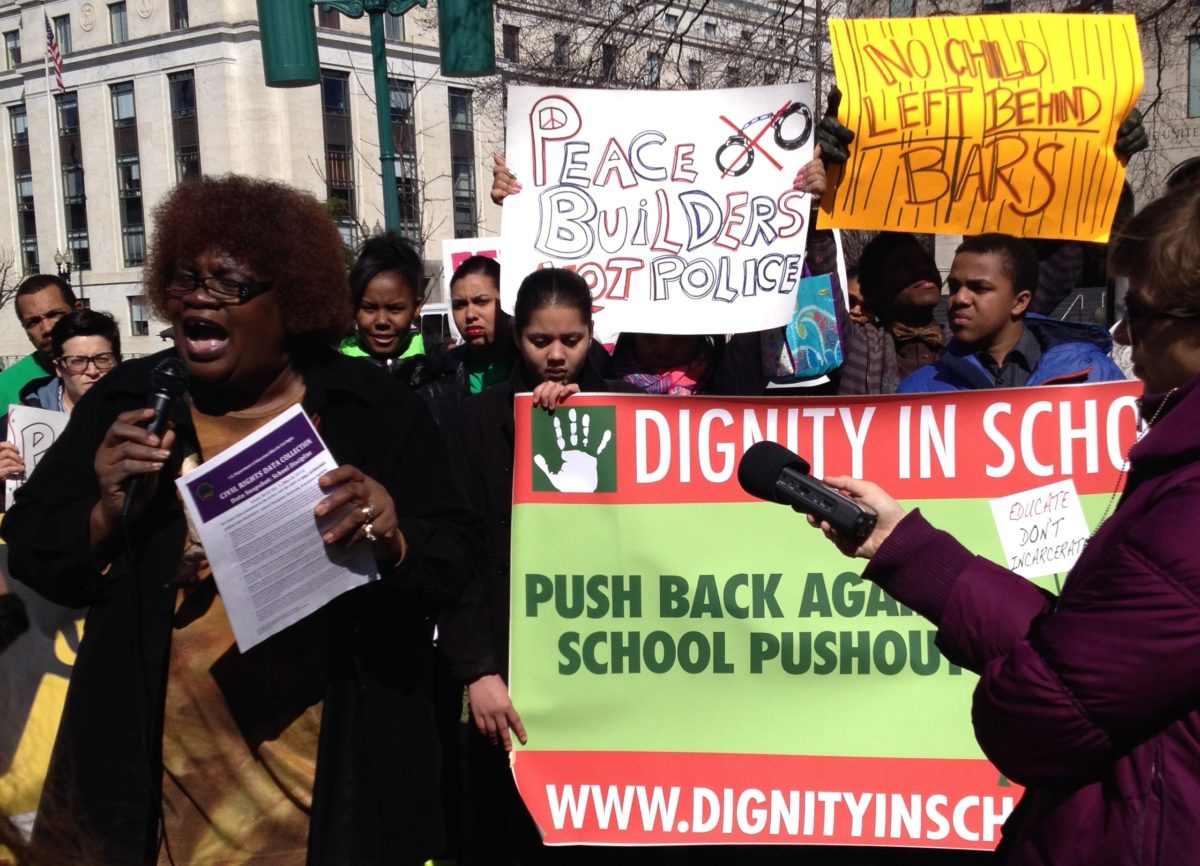Dignity in Schools Campaign Rallies in Washington DC for Positive Discipline

On March 24, students, parents and teachers from over 13 states and 50 organizations across the country with the Dignity in Schools Campaign (DSC) rallied at the U.S. Capitol to call for positive alternatives to police in schools and full implementation of positive approaches to school discipline, like restorative practices.
Members of DSC, a NESRI anchored coalition, were in Washington, DC for their Annual Membership Meeting and Days at the Capitol event to continue building a movement to end school pushout and ensure students' human rights to education and dignity. At the rally on Monday, DSC released School Discipline Assessments that compare new federal School Discipline Guidance released in January with local school district policies.
The School Discipline Assessments describe the lack of guidelines and accountability over the role of School Resource Officers in Wake County, NC, schools where students have been arrested for water balloon fights. In San Francisco, a district where African American students make up only 10% of the student population but 50% of suspensions, the Assessment highlights a new School Board Resolution passed this year that will support increased training in cultural competency and funding for restorative practices.
Kevine Boggess of Coleman Advocates for Children and Youth states that “while San Francisco has one of the highest performing school systems in the state, African American students have been left out of that success.”
“Wake County schools fail to seek input from or involve community members in crafting and creating positive school discipline practices,” says Rukiya Dillahunt of the Education Justice Alliance of Raleigh, North Carolina.
Last Friday, the Office of Civil Rights released new data on school discipline that shows continued racial disparities in school discipline nationwide. Alarmingly, Black preschool children represent 18% of preschool enrollment, but 48% of children receiving more than one out-of-school suspension. Black students represent 16% of student enrollment overall, but represent 27% of students referred to law enforcement and 31% of students subjected to a school-related arrest.
The federal guidance, released in January by the Departments of Education and Justice, lays out school districts’ civil rights obligations to address racial discrimination and provides tools to implement positive approaches that reduce suspensions, expulsions, and referrals to law enforcement and improve safety.
DSC youth members from Los Angeles’ Youth Justice Coalition and Power U in Miami highlighted the Youth of Color Statement on School Safety and Gun Violence in America which reflects some of the same guidance recommendations, such as implementing Restorative Justice. Such positive approaches to discipline develop the skills of the entire school community to resolve conflict and heal harm while holding students accountable for misbehavior.
Youth member Maritza Galvez of the Youth Justice Coalition stated that “Young people around the country experience being pushed out of school too many times,” and call for all federal, state, and local officials to “end zero-tolerance policies that take away school-based decision-making and force schools to suspend, expel and arrest students in order to be in compliance with the law or to receive federal or state funding.”
This week, DSC members also met with the White House Domestic Policy Council and the Department of Education to share experiences surrounding specific school discipline-related initiatives in their states, discuss the impacts of school discipline on students of color and students with disabilities, and call for reductions in the presence of law enforcement in schools.
The Dignity in Schools Campaign, a coalition made up of 78 organizations from 22 states, will use the Office of Civil Rights data and federal School Discipline Guidance to continue urging changes to our school systems’ discipline codes and practices.
